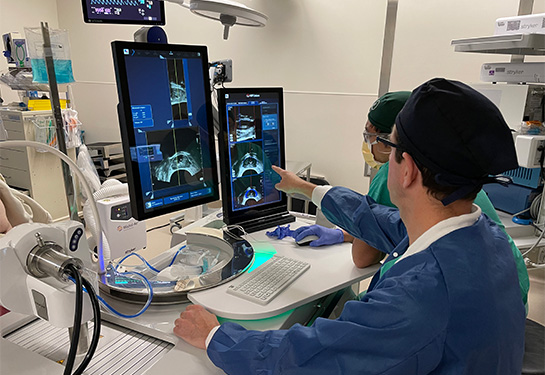Urologic Emergencies
Expert urologists and emergency medicine physicians work together to deliver immediate care for severe urologic conditions.
Medically reviewed by Marc Dall'Era, M.D. on Aug. 23, 2023.

Top-Ranked Care for Urologic Emergencies
At UC Davis Health, our nationally ranked urology program is home to top experts with experience evaluating and treating many urologic emergencies.
What Are Urologic Emergencies?
Urologic emergencies are conditions that severely affect how the urinary tract or male reproductive organs work. These emergencies are rare, but if left untreated, they can cause major health complications. It’s important to seek immediate medical attention for any urologic emergency.
Urologic emergencies can affect the:
- Kidneys (organs that filter waste from your blood)
- Ureters (tubes that carry urine from your kidneys to your bladder)
- Bladder (organ that holds urine)
- Urethra (tube that carries urine out of your body during urination)
- Penis (male sex organ)
- Scrotum (sac of skin that contains the testicles)
- Testicles (organs that produce sperm and make male sex hormones)
At UC Davis Health, our experts have experience evaluating and treating the following urologic emergencies:
- Acute urinary retention, when you’re unable to urinate (pee)
- Fournier’s gangrene, a life-threatening genital infection that destroys tissue
- Fractured penis, when tissue inside an erect penis tears due to forceful bending
- Paraphimosis, when the foreskin swells and gets caught behind the head of the penis
- Priapism, when you have a prolonged erection (not caused by sexual arousal) that lasts longer than four hours
- Testicular torsion, when a testicle twists and cuts off its own blood supply
- Urotrauma, when there is severe injury to the male reproductive or urinary tract organs
Symptoms of Urologic Emergencies
Symptoms of urologic emergencies vary widely depending on the condition. It’s important to seek urgent medical care if you notice symptoms. Fast treatment reduces the risk of serious complications.
Common Symptoms
Symptoms of urologic emergencies may include:
- Blood in your semen, urine or at the end of your penis
- Inability to urinate
- Nausea, vomiting or a high fever
- Painful, prolonged erection
- Sudden, severe pain in your lower abdomen or genitals
- Swelling or discoloration in your abdomen or genitals
Complications
Urologic emergencies can cause the following complications:
- Chronic kidney disease (CKD)
- Erectile dysfunction (ED)
- Necrosis (tissue death) or atrophy (nerve or muscle tissue shrinkage) in your genitals
- Permanent damage to urinary tract or reproductive organs
- Urinary problems due to scar tissue
Causes of Urologic Emergencies
Urologic emergencies can have many causes, ranging from pre-existing urinary tract conditions to sudden trauma.
Urinary Tract Obstructions
Obstructions are the leading cause of acute urinary retention, the most common urologic emergency. Blockages in your urinary tract, such as tumors, blood clots, scar tissue or stones, can prevent you from urinating. An enlarged prostate can also lead to urinary retention.
Infections and Immunosuppression
Severe urinary tract infections, sexually transmitted infections, bacterial infections and other skin and soft tissue infections can lead to urologic emergencies. Infections are especially dangerous in people with compromised immune systems.
Certain Medications and Drug Use
Some medications for blood pressure, psychiatric conditions or erectile dysfunction can lead to urologic complications.
Trauma
Falls, vehicle accidents, sports injuries, straddle injuries (forceful blow to the genitals), vigorous sex or wounds can cause trauma to the urinary tract or genitals. Surgery or a urinary catheter (flexible tube that drains urine from the bladder) can also lead to trauma and nerve damage.
Vascular Problems
Conditions or medications that affect blood flow in your genitals can lead to urologic emergencies. For example, trapped blood in your penis can cause a prolonged erection.
Diagnosing Urologic Emergencies
Urologic emergencies should be diagnosed in an emergency department. Your provider will likely start with a physical and visual examination of your genitals and pelvic region. They will also ask about your symptoms, medical history and any events that led up to your emergency.
Depending on your symptoms, your provider may recommend the following diagnostic tests:
- CT scan to detect blockages, tumors, swelling or injuries in your urinary tract
- Cystoscopy to examine your bladder using a tube and video camera inserted into your urethra
- Ultrasound to evaluate blood flow to your urinary and reproductive organs
- Urodynamic testing to evaluate bladder function and measure how well your bladder holds and releases urine
- X-rays with contrast dye to evaluate the size and shape of your urinary and reproductive organs
Treatments for Urologic Emergencies
At UC Davis Health, we have the expertise to treat urologic emergencies promptly and effectively. Our specialists offer the latest treatments, with a focus on preventing long-term complications and preserving urinary and reproductive function.
We specialize in minimally invasive urologic surgery using laparoscopic and robotic techniques. These procedures use small incisions, so you recover faster and with less pain.
Our surgeons also perform complex genitourinary (genital and urinary organs) reconstructions. Experts in reconstructive urology rebuild the bladder, urethra and penis after severe trauma or other urologic emergencies. Urologic reconstruction can improve symptoms such as erectile dysfunction (ED) and urinary incontinence (accidental urine leakage). It can also restore the appearance of your genitals.
Treatments for urologic emergencies may include:
Acute Urinary Retention Treatment
We insert a catheter into your urethra to drain urine from your bladder. We may do surgery to remove urinary blockages such as stones, scar tissue or an enlarged prostate.
Fournier’s Gangrene Treatment
We do immediate surgery to remove damaged and dead tissue. You may need multiple procedures in phases to prevent the bacterial infection from spreading. After surgery, your provider will prescribe antibiotics.
Fractured Penis Treatment
A fractured penis requires surgical repair of the torn tissue inside the penis. Surgery lowers the risk of complications such as penile curvature and ED.
Paraphimosis Treatment
We reduce foreskin swelling using compression, ice or aspiration (using a needle and syringe to remove fluid). We may be able to pull the foreskin back to its normal position manually. In some cases, we cut a slit in the foreskin to reposition it or remove the foreskin completely (circumcision).
Priapism Treatment
We aspirate blood from the penis and inject the penile blood vessels with saline (sterile water) and medication to soften the erection. If these methods fail, we do penile shunt surgery. This surgery creates a new route for blood to leave the penis.
Testicular Torsion Treatment
Testicular torsion requires immediate surgical treatment (within six hours) to restore blood flow to the testicle. About 75% of people with testicular torsion require surgical removal of their testicle (orchiectomy).
Urotrauma Treatment
Most forms of urotrauma (injury to the urinary tract or reproductive organs) require surgical repair. You may need a catheter after surgery to drain urine from your bladder as your urinary tract or reproductive organs heal.
"Urologic Emergencies," American Urological Association," https://www.auanet.org/meetings-and-education/for-medical-students/medical-students-curriculum/urologic-emergencies
"Testicular Torsion," Urology Care Foundation, https://www.urologyhealth.org/urologic-conditions/testicular-torsion
How common are urologic emergencies?
30%Of men ages 80-89 have at least one episode of acute urinary retention
Source: American Urological Association: Urologic Emergencies
Request an Appointment
As Sacramento's No. 1 hospital, you'll benefit from unique advantages in primary care and specialty care. This includes prevention, diagnosis and treatment options from experts in 150 specialties.
Referring Physicians
To refer a patient, you can submit an electronic referral form or call.
800-4-UCDAVIS
Patients
For questions and appointment information
Consumer Resource Center
800-2-UCDAVIS

Ranked among the nation’s best hospitals
A U.S. News & World Report best hospital in cancer, cardiology, heart & vascular surgery, diabetes & endocrinology, ENT, geriatrics, neurology & neurosurgery, obstetrics & gynecology, and pulmonology & lung surgery.

Ranked among the nation’s best children’s hospitals
A U.S. News & World Report best children’s hospital in diabetes & endocrinology, nephrology, and orthopedics*. (*Together with Shriners Children’s)

Ranked Sacramento’s #1 hospital
Ranked Sacramento’s #1 hospital by U.S. News, and high-performing in COPD, colon cancer surgery, diabetes, heart attack, heart failure, hip fracture, hip replacement, kidney failure, leukemia, lymphoma & myeloma, lung cancer surgery, ovarian cancer surgery, pneumonia, prostate cancer surgery, stroke, TAVR, uterine cancer surgery, gastroenterology & GI surgery, and orthopedics.

The nation’s highest nursing honor
UC Davis Medical Center has received Magnet® recognition, the nation’s highest honor for nursing excellence.

“Most Wired” for acute care
UC Davis Health has been recognized as a level 10 out of 10 in the Digital Health “Most Wired” program from the College of Healthcare Information Management Executives (CHIME). The honor recognizes excellence in using technology to improve the delivery of care.

“Most Wired” for ambulatory care
UC Davis Health has been recognized as a level 10 out of 10 in the Digital Health “Most Wired” program from the College of Healthcare Information Management Executives (CHIME). The honor recognizes excellence in using technology to improve the delivery of care.

World-class cancer care
One of ~56 U.S. cancer centers designated “comprehensive” by the National Cancer Institute.

A leader in health care equality
For the 11th consecutive year, UC Davis Medical Center has been recognized as a “Leader in LGBTQ+ Healthcare Equality.”

